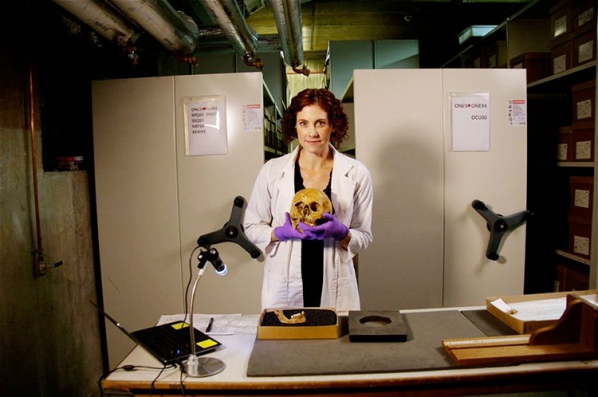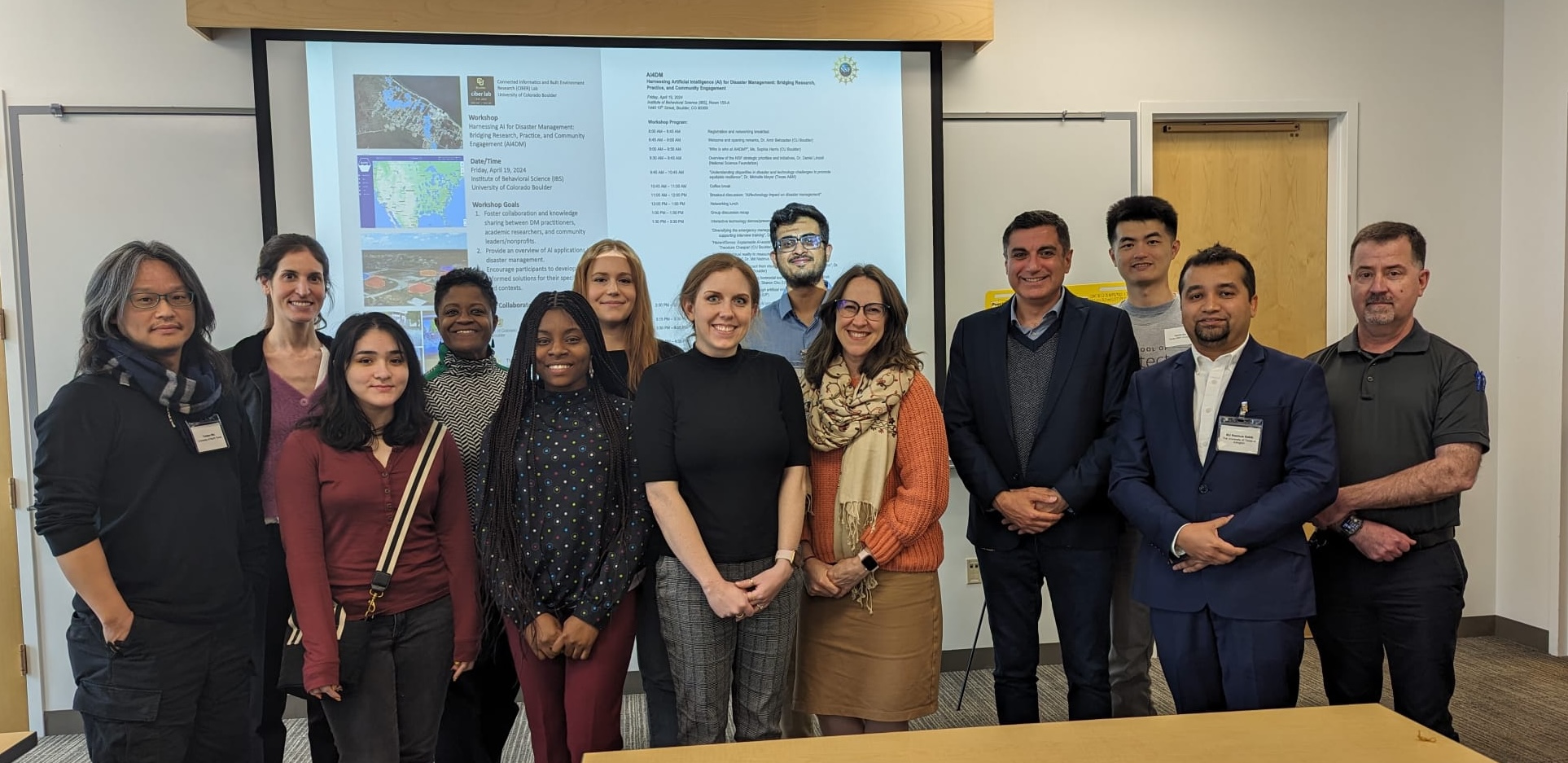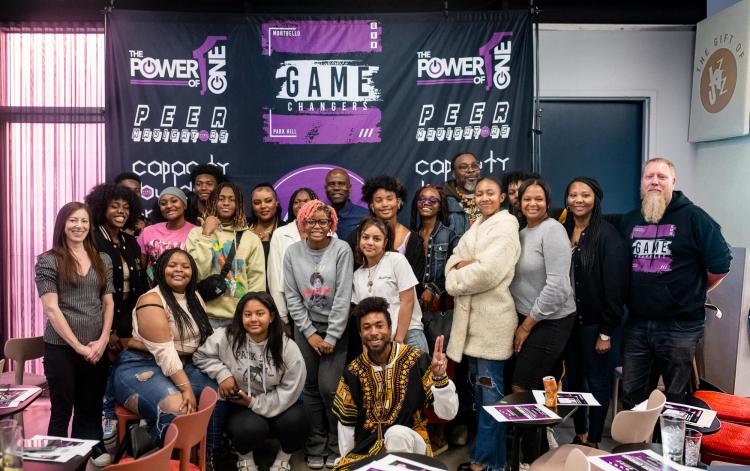Sharon Dewitte, IBS faculty, fellow, and associate professor of anthropology at CU Boulder, was recently featured on a news segment for Mendocino County. DeWitte discussed her research on medieval plague, a history of the Black Plague, and what health outcomes can acquire from bones. Hear her interview with It’s a New Day host, Julie Beardsley, at the link below. Interview is on October 16, 2024.
News
All news items, blog posts, and feature stories.
The reasons why people stay in harms way, by Carson MacPherson-Krutsky
Research Associate at the Natural Hazards Center, Carson MacPherson-Krutsky, contributed a recent article to the Conversation. She wrote about her research into natural hazards and human behavior: why some people choose to stay behind during natural disasters, and what we can do to make evacuation communications more effective and accessible.
New CRW grant to increase Coloradans’ access to trauma-informed, evidence-based services
The Center for Resilience and Well-Being (CRW) was recently awarded a 3 million grant from the Substance Abuse and Mental Health Services Administration’s (SAMHSA) National Child Traumatic Stress Network (NCTSN) with several community partners. The grant will fund the five-year project, “The Community Collective for Trauma-Informed, Evidence-Based Prevention and Treatment Services.”
The project has three main goals, all of which will involve deep collaboration with community partners:
- Develop collaborative infrastructure for a community-based prevention hub that provides trauma-informed, evidence-based prevention services (TI-EBPs) for youth, families and schools.
- Improve behavioral health outcomes and reduce health disparities by implementing and sustaining culturally responsive TI-EBPs in local and rural communities.
- Promote long-term sustainability of culturally responsive TI-EBPs for youth and families exposed to trauma.
“It is an honor and a privilege to receive this award,” says CRW Director and Principal Investigator for the project,” Monica Fitzgerald. “It allows us to closely partner with youth-serving community agencies and schools in local Boulder County and across urban and rural parts of Colorado to increase youth and family access to the highest quality trauma-informed and evidence-based prevention and intervention supports. These programs and services will be provided in English and Spanish and embedded where families feel most comfortable seeking services and resources.”
Along with front range communities, Montrose and Garfield counties will receive access to TI-EBPs, facilitated through regional coordinators. Rural communities in particular experience higher rates of adverse childhood events and barriers to services, including issues with transportation, insurance, language, availability and stigma.
The project also addresses critical gaps in access to linguistically and culturally responsive services. Despite 50% of the population speaking Spanish, Garfield County has a shortage of Spanish-lead services. Meghan Backofen, regional coordinator for Garfield County and child welfare treatment provider for Garfield’s Human Services Department, emphasizes the lack of parenting classes for Spanish-speaking parents and Spanish-speaking therapy and treatment providers as a key cause of health disparity for her community.
In the past four years, two-thirds of family services provided by CRW and their partners in Boulder and Broomfield counties were delivered in Spanish, and the team is excited to expand these efforts with the SAMHSA grant. Their local team includes bilingual/ bicultural staff dedicated to community outreach, engagement, and service delivery, as well as amplifying the voices of families and ensuring cultural relevance and accessibility of all CRW programs and resources. Backofen looks forward to the grant increasing TI-EBP training and the availability of bilingual providers and services in Garfield County.
Along with Backofen, Jessica Gorrono, regional coordinator for Montrose County, is enthusiastic about the impact of TI-EBPs on her home county.
“The funding from this award will allow the systems, professionals and community members that work each day to improve the well-being and mental health of the youth and families who are the future of this community,” says Gorrono. “I’m particularly excited about the opportunity to increase access to high quality prevention services to further build resilience in Montrose’s youth and families,” says Gorrono.
The project will implement the following TI-EBPs within communities:
- Prevention Services: Let’s Connect® (LC) for families, Resilience in Schools and Educators (RISE) for schools, and the Calm and Connected Toolkit (CCT) for Mental Health Prevention in schools.
- Treatments/Therapy: Trauma-Focused Cognitive Behavioral Therapy® (TF-CBT), Alternatives for Families Cognitive Behavioral Therapy®(AF-CBT)
The SAMHSA NCTSN program was a natural fit for the CRW project. The purpose of the grant program is to increase access to effective trauma and grief-focused treatment and service systems for children, adolescents, and families who have experienced traumatic events. Through the program, SAMHSA aims to raise the standard of care and improve access to evidence-based services for children experiencing trauma across the nation. By focusing on rural and high-need communities of Colorado, the CRW project will showcase the effectiveness and sustainability of implementing TI-EBPs nationwide.
“Evidence-based prevention is one of the most powerful and cost-effective strategies for promoting health and reducing risk and behavioral health challenges for all youth, making it a powerful tool for promoting resilience and reducing health disparities,” says Shipman, who is PI on the project. “We are excited to expand this work with our partners and families throughout Colorado.”
To learn more about the project, visit the project website.
To learn more about the grant program, visit the SAMHSA website and NCTSN website.
Jillian Turanovic, Emma Fridel awarded $1 million to lead study on red flag laws
Assistant Professor of Criminology at Florida State University, Emma Fridel, and Associate Professor of Sociology at CU Boulder and IBS Faculty Fellow, Jillian Turanovic, will lead a study to provide a “clear and sweeping look” at the effects of red flag laws. Red Flag Laws or RPOs, allow law enforcement agencies to file for the temporary removal of firearms from those who may be a danger to others or themselves. Currently, 19 states including Florida have RPOs, though little research has been done on their effects. The U.S. Department of Justice’s National Institute of Justice awarded $700,000 to the study, focusing on interpersonal violence. The National Collaborative on Gun Violence Research provided an additional $360,000 to expand the study’s scope to include effects on suicide. Learn more about the study from Florida State University’s College of Criminology & Criminal Justice News.
CU Boulder Earns Abstract of Distinction Award at 32nd Annual SPR Meeting
A roundtable symposium chaired by Pamela Buckley, associate research professor and fellow at the Institute of Behavioral Science (IBS), has earned the 2024 Society for Prevention Research (SPR) Abstract of Distinction Award. The presentation, titled “How Can Clearinghouses Help the Field Re-Envision, Re-Tool and Improve upon the Measurement Tools, Methodologies, and Dissemination Processes of Evidence-Based Preventive Interventions to Promote Equitable Health for Children, Families and Communities?” will feature Buckley as well as Christine Steeger, Karl Hill, and Blueprints for Healthy Youth Development board members Abby Fagan, Frances Gardner and Velma McBride Murry.
The Annual SPR Meeting is the premiere conference for prevention science professionals. This is the eighth year the SPR has conferred abstracts of distinction, which “highlight abstracts and topics that are particularly noteworthy and are likely to generate excitement and attendance at the presentations.” This is also the second time the Blueprints team has earned this distinction. The team won the Abstract of Distinction back in 2022 for a symposium organized by Karl Hill, titled “Common Flaws in Designing and Analyzing Preventive Interventions and How to Avoid Them“.
The SPR meeting will be held next week, May 28-31, on Capitol Hill in Washington, D.C. In addition to the roundtable, several IBS fellows and faculty are also presenting. Below is a list of all presentations from CU Boulder:
Amir Behzadan hosts workshop for culturally sensitive AI solutions to disasters
Amir Behzadan, professor in the Department of Civil, Environmental and Architectural Engineering and a faculty research fellow of the Natural Hazards Center, hosted the Harnessing Artificial Intelligence (AI) for Disaster Management workshop on April 19. The AI4DM workshop aimed to address disaster and emergency management’s hesitation toward AI, as well as a lack of diversity in the workplace leading to subsequent delayed or unfair aid to lower income communities hit by disasters. Susan Glairon, communications specialist for the Community Engagement, Design and Research Center (CEDaR) writes more about the workshop and its implications for disaster and emergency management here.
Remembering the Generosity, Loyalty and Exceptional Career of David Huizinga
David Huizinga, a senior research associate at IBS, passed away on April 5, 2024. He was 82 years old. A memorial service will be held at IBS on Satuday, June 15 at 1 p.m. MT.
An alumnus of The University of Wyoming, Huizinga earned both his Bachelors and Masters of Economics in 1963 and 1965. He earned his Ph.D in Psychology from the University of Colorado in 1977, whereupon he joined the Institute of Behavioral Science and had a distinguished 40-year career.
Known by many as hard working and accurate to a tee, Huizinga was also open-minded, patient, and loyal. He may be best known as the principle investigator for the Denver Youth Study (1988-1992), a five-wave longitudinal study of youth and parents in Denver-area, high-risk neighborhoods. Together with Del Elliott, professor emeritus and founder of both CSPV and what-is-now PSP, and the late Frank Dunford, a researcher and criminologist at IBS, Huizinga set a standard for longitudinal research on adolescent health and development.
“Dave was a stickler for accuracy and detail but very even tempered and patient, always generous with his time,” says Del Elliott. “I owe a great debt to Dave, he was my close, talented, dependable partner over most of my career and my success as a researcher and scholar relied significantly on his friendship and generous contribution to my work.”
Huizinga was renown for his mathematical expertise and experience in data processing and analysis. He was often asked to consult both criminological researchers and researchers in other areas involving large data sets and complicated data analysis problems. Huizinga also implemented techniques to protect the identity of human subjects in large data sets while still providing general access to the data.
“Dave Huizinga was a stalwart in the Problem Behavior Program in IBS,” says Richard Jessor, distinguished professor emeritus of behavioral science, professor emeritus of psychology and former director of IBS. “He was successful in bringing funds to IBS but, more important, he brought his methodological and conceptual skills to bear on the refractory task of illuminating life course development. He was a valued colleague and a model for others in IBS to emulate. His absence will be felt.”
In many ways, the legacy of David Huizinga will continue, whether through data techniques he created, password protocols he advised, or through the many David-ism sayings passed down in CSPV. IBS will continue its mission on collecting world-changing research thanks in part to the career and character of David Huizinga.
Colleen Scanlan Lyons Moderates at Pivotal Meeting on New Forest Economy
From April 23 to April 26, the Governors’ Climate and Forests Task Force (GCF Task Force) held an important and collaborative meeting in Santa Cruz de la Sierra, Bolivia. The event saw key stakeholders collaborating on how to create a New Forest Economy that balances protecting forests with economic opportunities and protected livelihoods for local communities and Indigenous Peoples. Colleen Scanlan Lyons, associate research professor in the Department of Environmental Studies, IBS fellow and interim director for the Center for the Governance of Natural Resources, is a GCF task force project director and helped moderate discussions at the meeting. Learn more about this event here.
CSPV-Supported Initiative Confronting Youth Violence Crisis
A group of Denver-area youth working together to address the violence they’re seeing in their schools. Called the Game-Changers, the group was formed in 2023 by the Youth Violence Prevention Center-Denver (YVPC-Denver), an outgrowth of the Center for the Study and Prevention of Violence. Lisa Marshall, Science Writer for CU Boulder Today, shares more about the group, YVPC-Denver and their monumental work in combatting school violence in CU Boulder Today.









